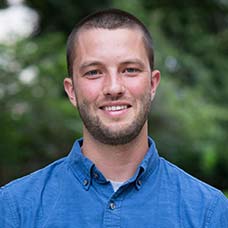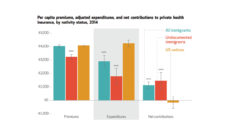Under the recently announced Migrant Protection Protocols, also known as “Remain in Mexico,” people fleeing violence across Central America are being returned to Mexico while they wait out asylum determinations from the US government. Much of the ensuing discussion leaves out that the US and European countries are not the only nations that grant asylum. Among many other countries, Mexico does too. However, aslyum in Mexico offers only tenuous protection. As practitioners and researchers, we have spent time with asylum seekers in Mexico, people like Magda who continue to face acute dangers after being officially recognized as refugees by the Mexican government. Magda’s story speaks to some of the dangers associated with the Migrant Protection Protocols.
Magda is a survivor of intimate partner violence. At fifteen years old she became the mother of a beautiful baby girl by a man who abused her over the course of their two-year relationship. Magda and her daughter escaped to family in a nearby town, but the father of her daughter responded by intimidating Magda and her family so that she would return to him.
On the cusp of her eighteenth birthday, Magda left her daughter with her mother and fled El Salvador. As with many women escaping intimate partner violence across Central America, Magda left home suddenly. Upon reaching Mexico, she hopped freight trains—a relatively cheap but dangerous means of travel—until arriving at the migrant shelter where we were both working. In 2014, the Mexican government intensified policing along railways in the name of protecting unaccompanied minors like Magda. Instead of protecting young people, this policing has made the journey through Mexico more dangerous and circuitous. People become “stuck” in Mexico after running out of money or suffering abuses. In this context, a growing number of Central Americans like Magda seek formal humanitarian recognition from the Mexican government as a “plan B.”
As a survivor of intimate partner violence, Magda petitioned Mexico’s refugee commission for asylum. Historically, Mexico’s shelters have helped people who are just passing through. Many shelters lack the resources needed to sufficiently support people pursuing refugee status, a process that can last several months. Applying for asylum is distressing. It means putting your life on hold, often without the means to support family back home. As a result, people often abandon asylum cases and continue their journeys, prioritizing the chance to reach the US over the uncertainty of waiting out bureaucracies in Mexico.
After three months of waiting, Magda received word from the Mexican government that her petition for refugee status had been approved. But when she was told that she would have to wait several more weeks for official immigration documents to be processed, she left the shelter and we didn’t hear from her for several months.
A few weeks ago, Magda messaged both of us over Facebook. She explained that, after leaving the shelter, she eventually made it to the US-Mexico border. There, she was kidnapped by traffickers, smuggled across the border, and forced into prostitution in Los Angeles for several months until being arrested and detained by ICE. Traumatized by what had happened to her, Magda did not inform US officials that she had been recognized as an asylee in Mexico. As a result, she was deported back to El Salvador.
The chain of traumas Magda has experienced points to the health implications of policies like the Migrant Protection Protocols that trap people in Mexico. Seeking asylum should offer relief from persecution. But, for many, navigating bureaucracies while in Mexico is a form of persecution. Policies like the Migration Protection Protocols are likely to exacerbate existing traumas as people like Magda navigate the dangers of daily life in Mexico. The associated traumas are long-lasting and they ripple through communities. These policies will likely discourage people from seeking help from institutions that purport to “protect” them. As opposed to policies like the Migrant Protection Protocols, we need an asylum system that provides affordable housing, work authorization, and a safe environment while awaiting asylum determinations, conditions that are often difficult to find in Mexico.
Editor’s Note: The authors include a translation of the article from English to Spanish below.
Version en español: Los Nuevos “Protocoloes de Protección al Migrante” No “Protegen,” Agravan Peligros
Bajo los nuevos Protocolos de Protección a Migrantes, también conocido como “Queda en México,” el gobierno de los EEUU está devolviendo Centroamericanos huyendo de violencia en Centroamérica mientras esperan determinaciones en sus casos. Mucha gente no se da cuenta que además de los EEUU y países de Europa, México, junto con varias otras naciones, también ofrece asilo. Sin embargo, para muchas personas, recibir asilo en México ofrece una forma de protección sumamente tenue. Como coloboradores con una casa de migrante en México, hemos convivido con personas siguiendo el proceso de pedir asilo en México, gente como Magda quienes enfrentan peligros en México aún despues de ser reconocidos como refugiados por el gobierno Mexicano. La experiencia de Magda muestra algunos de los peligros implicados en una política de ‘queda en México.’
Magda es sobreviviente de la violencia de género. A los quince años fue madre de una hermosa niña, producto de una relación violenta que duró dos años. Ante esta situación, Magda junto con su hija decide escapar y pedir ayuda a su familia cercana, pero el papá de su hija siempre la intimidó a Magda para que regresara con él.
Poco antes de cumplir 18 años, Magda se vio forzada a dejar a su hija en las manos de su madre y huyó de El Salvador. Como muchas mujeres que escapan violencia de pareja en centroámerica, Magda se fue de su casa de repente. Al llegar a México, viajó en tren—un camino relativamente barato, aunque peligroso—hasta llegar a la casa de migrante donde trabajábamos. En 2014, el gobierno Mexicano intensificó operativos en las vías a nombre de proteger menores no acompañados como Magda. En vez de proteger, los operativos han resultado en viajes más peligrosos y más largos. Muchas personas vuelven atorados en México al quedarse sin dinero o después de sufrir abusos. En esto contexto, más y más centroamericanos como Magda buscan reconocimiento humanitaria del gobierno mexicano como un “plan B.”
Como sobreviviente de violencia de pareja, Magda tramitó asilo con el gobierno de México. Históricamente, las casas de migrante en México han apoyado gente de paso. Muchos albergues faltan recursos suficientes para apoyar a personas en trámites, un proceso que puede tardar varios meses. Pedir asilo es estresante. Implica frenar tu vida por varios meses sin la manera de apoyar a familiares en su país de origen. Como resultado, es común que gente como Magda abandonan sus casos para seguir sus viajes. Priorizan la posibilidad de ganar dólares en los EEUU ante los hostigamientos del proceso de tramitar asilo.
Después de tres meses en espera, Magda le avisaron a Magda que le habían aprobado su caso. Pero cuando la dijeron que todavía tendría que esperar varias semanas mientras procesaron sus papeles de migración, Magde se desesperó y se fue del albergue. Pasamos varios meses sin comunicarse con Magda. Hace unas semanas, Magda nos mensajeó por Facebook. Nos explicó que después de salir del albergue llegó a la frontera con los EEUU. Allí le secuestraron, la cruzaron a Los Ángeles, y fue prostituida por varios meses hasta ser detenido por policías. Traumatizada, Magda no les informó a los oficiales de los EEUU que era refugiado en México así que le deportaron a El Salvador.
La cadena de traumas que Magda ha vivido tiene implicaciones de salud para programas como los Protocolos que atrapan a migrantes en México. Pedir asilo debe ser un alivio de persecución. Para muchas personas, el proceso de navegar burocracias se siente como una forma de persecución. Programas como los Protocolos de Protección a Migrantes solo van a agravar las traumas que personas como Magda experimenten. Estos traumas tienen impactos de largo plazo que extienden por comunidades y familias. También disuaden a personas como Magda de pedir apoyo de instituciones que pretenden “proteger.” En vez de programas como los Protocolos, necesitamos un sistema de asilo que ofrece vivienda accesible, autorización para trabajar, y un ambiente seguro mientras personas como Magda esperan determinaciones, condiciones que en muchos casos son difíciles de encontrar en México.
Image courtesy of the author















